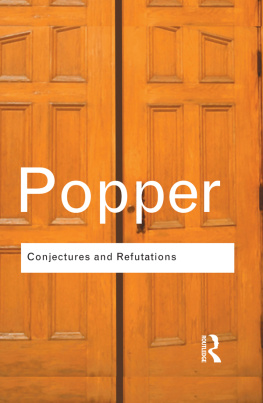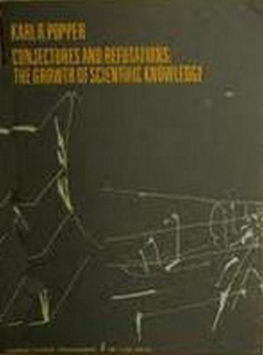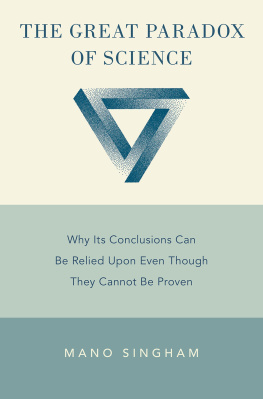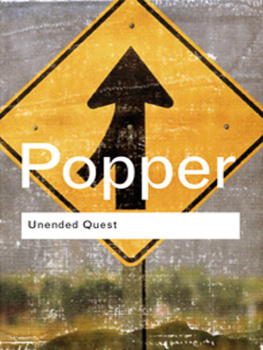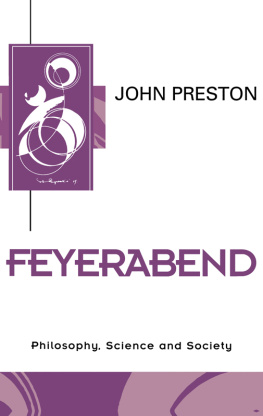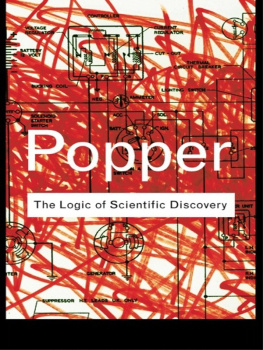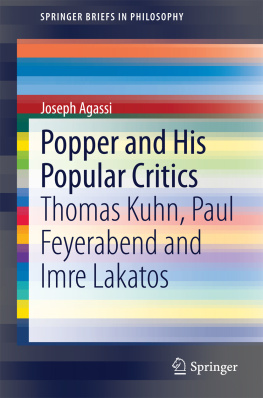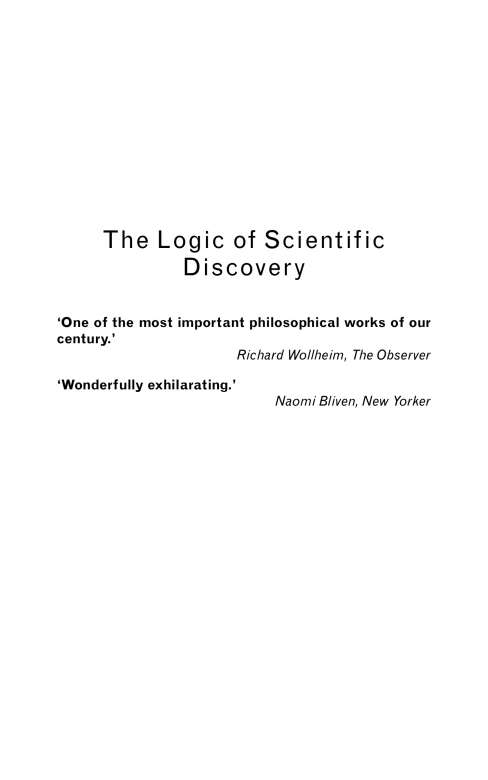Logik der Forschung first published 1935
by Verlag von Julius Springer, Vienna, Austria
First English edition published 1959
by Hutchinson & Co.
First published by Routledge 1992
First published in Routledge Classics 2002 by Routledge
11 New Fetter Lane, London EC4P4EE 29 West 35th Street, New York, NY 10001
Routledge is an imprint of the Taylor el Francis Croup
This edition published in the Taylor & Francis e-Library, 2005.
"To purchase your own copy of this or any of Taylor & Francis or Routledge's collection of thousands of eBooks please go to www.eBookstore.tandf.co.uk."
1959, 1968, 1972, 1980 Karl Popper 1 999. 2002 The Estate of Karl Popper
All rights reserved. No part of this book may be reprinted or reproduced or utilised in any form or by any electronic, mechanical, or other means, now known or hereafter invented, including photocopying and recording, or in any information storage or retrieval system, without permission in writing from the publishers.
British Library Cataloguing in Publication Data
A catalogue record for this book is available from the British Library
Library of Congress Cataloging in Publication Data A catalogue record for this book has been requested
ISBN 0-203-99462-0 Master e-book ISBN
ISBN 0-415-27843-0 (hbk) ISBN 0-415-27844-9 (pbk)
TO MY WIFE who is responsible for the revival of this book
Contents
Translators' Note xii
Preface to the First Edition, 1934 xv
Preface to the FirstEnclish Edition, 1959 xviii
PART I Introduction to the Logic of Science
1 A Survey of Some Fundamental Problems 3
1 The Problem of Induction
2 Elimination of Psychologism
3 Deductive Testing of Theories
4 The Problem of Demarcation
5 Experience as a Method
6 Falsifiability as a Criterion of Demarcation
7 The Problem of the 'Empirical Basis'
8 Scientific Objectivity and Subjective Conviction
2 On the Problem of a Theory of Scientific Method 27
9 Why Methodological Decisions are Indispensable 70 The Naturalistic Approach to the Theory of Method 11 Methodological Rules as Conventions
Viii CONTENTS
PART II Some Structural Components of a Theory of Experience
3 Theories 37
12 Causality, Explanation, and the Deduction of Predictions
13 Strict and Numerical Universality
14 Universal Concepts and Individual Concepts 75 Strictly Universal and Existential Statements 7 6 Theoretical Systems
77 Some Possibilities of Interpreting a System of Axioms
t8 Levels of Universality. The Modus Tollens
4 Falsifiability 57 79 Some Conventionalist Objections
20 Methodological Rules
27 Logical Investigation of Falsifiability
22 Falsifiability and Falsification
23 Occurrences and Events
24 Falsifiability and Consistency
5 The Problem of the Empirical Basis 74
25 Perceptual Experiences as Empirical Basis: Psychologism
26 Concerning the So-Called 'Protocol Sentences'
27 The Objectivity of the Empirical Basis
28 Basic Statements
29 The Relativity of Basic Statements. Resolution of Fries's Trilemma
30 Theory and Experiment
6 Degrees of Testability 95 37 A Programme and an Illustration
32 How are Classes of Potential Falsifiers to be Compared?
33 Degrees of Falsifiability Compared by Means of the Subclass Relation
34 The Structure of the Subclass Relation. Logical Probability
35 Empirical Content, Entailment, and Degrees of Falsifiability
CON
37 Logical Ranges. Notes on the Theory of Measurement
38 Degrees of Testability Compared by Reference to Dimensions
39 The Dimension of a Set of Curves
40 Two Ways of Reducing the Number of Dimensions of a Set of Curves
Simplicity
47 Elimination of the Aesthetic and the Pragmatic Concepts of Simplicity
42 The Methodological Problem of Simplicity
43 Simplicity and Degree of Falsif ability
44 Geometrical Shape and Functional Form
45 The Simplicity of Euclidean Geometry
46 Conventionalism and the Concept of Simplicity
Probability
47 The Problem of Interpreting Probability Statements
48 Subjective and Objective Interpretations
49 The Fundamental Problem of the Theory of Chance
50 The Frequency Theory of von Mises 57 Plan for a New Theory of Probability
52 Relative Frequency within a Finite Class
53 Selection, Independence, Insensitiveness, Irrelevance
54 Finite Sequences. Ordinal Selection and Neighbourhood Selection
55 n-Freedom in Finite Sequences
56 Sequences of Segments. The First Form of the Binomial Formula
57 Infinite Sequences. Hypothetical Estimates of Frequency
58 An Examination of the Axiom of Randomness
59 Chance-Like Sequences. Objective Probability
60 Bernoulli's Problem
61 The Law of Great Numbers (Bernoulli's Theorem)
62 Bernoulli's Theorem and the Interpretation of Probability Statements
CONTENTS
64 Elimination of the Axiom of Convergence. Solution
of the 'Fundamental Problem of the Theory of Chance'
65 The Problem of Decidability
66 The Logical Form of Probability Statements
67 A Probabilistic System of Speculative Metaphysics
68 Probability in Physics
69 Law and Chance
70 The Deducibility of Macro Laws from Micro Laws ji Formally Singular Probability Statements
72 The Theory of Range
9 Some Observations on Quantum Theory 209
73 Heisenberg's Programme and the Uncertainty Relations
74 A Brief Outline of the Statistical Interpretation of Quantum Theory
75 A Statistical Re-Interpretation of the Uncertainty Formulae
76 An Attempt to Eliminate Metaphysical Elements by Inverting Heisenberg's Programme; with Applications
77 Decisive Experiments
j8 Indeterminist Metaphysics
10 Corroboration, or How a Theory Stands up to Tests 248
79 Concerning the So-Called Verification of Hypotheses
80 The Probability of a Hypothesis and the Probability of Events: Criticism of Probability Logic
81 Inductive Logic and Probability Logic
82 The Positive Theory of Corroboration: How a Hypothesis may 'Prove its Mettle'
S3 Corroborability, Testability, and Logical Probability
84 Remarks Concerning the Use of the Concepts 'True' and 'Corroborated'
85 The Path of Science
APPENDICES
i Definition of the Dimension of a Theory 283
ii The General Calculus of Frequency in Finite Classes 286
CONTENTS Xi
INDICES, compiled by Dr. J. Agassi
Name Index Subject Index
489 494
Translators' Note
The Logic of Scientific Discovery is a translation of Logik der Forschung, published in Vienna in the autumn of 1934 (with the imprint '1935'). The translation was prepared by the author, with the assistance of Dr. Julius Freed and Lan Freed.
The original text of 1934 has been left unchanged for the purpose of the translation. As usual, the translation is a little longer than the original. Words and phrases for which no equivalent exists had to be paraphrased. Sentences had to be broken up and rearrangedthe more so as the text to be translated was highly condensed: it had been drastically cut several times to comply with the publisher's requirements. Yet the author decided against augmenting the text, and also against restoring cut passages [except for a few words indicated by square brackets or footnotes].



